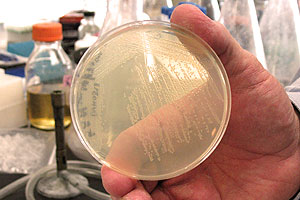 Concern over global warming and rising gas prices has just about everyone, including presidential candidates, touting biofuels. Taking the energy from plants to make a gasoline alternative that can run our cars has great promise. But there are challenges to meeting the nation’s goal to replace 20 per cent of the nations annual gasoline consumption with renewable fuels by 2017. Today's radio report is on the next generation of biofuels being developed right here in the Bay Area.
Concern over global warming and rising gas prices has just about everyone, including presidential candidates, touting biofuels. Taking the energy from plants to make a gasoline alternative that can run our cars has great promise. But there are challenges to meeting the nation’s goal to replace 20 per cent of the nations annual gasoline consumption with renewable fuels by 2017. Today's radio report is on the next generation of biofuels being developed right here in the Bay Area.
The biofuels we look at in this piece are primarily cellulose-based. Some of the researchers we talked with called the products they are designing, biopetrol because they are trying to mimic, synthetically, what petroleum does. The San Carlos start up, LS9, is making a biopetrol product. The hope of these researchers is to use plant matter, or biomass, to make a cellulosic biofuel that can be used in the existing petroleum infrastructure without needing to change pipelines, pumps at stations or gas tanks.
There are a number of California companies and research institutions working on developing advanced biofuels. The big, new academic center for research is the Joint Bio Energy Institute out of Emeryville.
As you will hear in this story, some are tinkering with microbes, others are trying to improve on current feedstocks.
Biofuels don’t have to come from traditional plants in the ground but can come from converting algae or trash into biodiesel. While that is not the focus of this story, we hope to take it up in the coming months.
